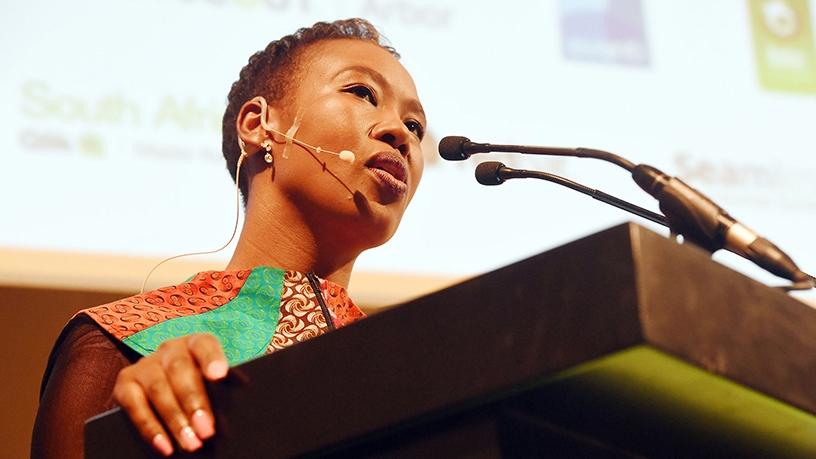
The Department of Telecoms and Postal Services is looking into satellite technology as a possible way to bring Internet connectivity to all South Africans.
This is according to deputy minister Stella Ndabeni-Abrahams, speaking to ITWeb on the side-lines of the AfricaCom 2017 conference in Cape Town.
"For SA Connect we have not said yes we are automatically going to integrate satellite, but it's something that we are considering," she said.
SA Connect is the national broadband policy adopted by Cabinet in 2013. The project aims to deliver 100% broadband connectivity to government facilities by 2020. It is also expected to deliver broadband access to 90% of the country's population by 2020 and 100% by 2030.
Ndabeni-Abrahams admitted the pace of the roll out of SA Connect is not as fast as the department would like and it was looking at other avenues to make sure it reaches its targets as part of the programme for 'Internet for All'.
Last month, it was revealed changes to the implementation model for phase one of SA Connect had resulted in delays in rolling out the broadband project. This was shown in the Adjusted Estimates of National Expenditure document, which formed part of the 2017 Medium-Term Budget Policy Statement presented by finance minister Malusi Gigaba.
"To date in 2017/18, the department has connected two government institutions out of a targeted 2 700 for the year, and not connected any schools out of its target of 887," the document revealed.
Ndabeni-Abrahams said when looking at long-term investment plans for SA's broadband project, satellite technology was a possibility to aid where terrestrial networks are unable to provide connectivity. She said the department was talking to experts and looking to partners to advise about the best way forward.
Satellite benefits
Ndabeni-Abrahams also gave a keynote address at AfricaCom heavily focused on how satellite communications can help connect the continent.
"At the core of our vision for Africa, is a connected continent where every village, every woman, every man and every child have access to education, entertainment and knowledge via broadband connectivity. We note that while asingle terrestrial base station can cover a village, a single satellite has the ability to cover not only one country, but a few countries," she said.
"Satellite communication has numerous benefits over terrestrial alternatives. For instance, a small group or constellation of satellites can cover virtually all of Earth's surface. More specifically, one satellite can cover a much larger number of potential subscribers than any terrestrial network.
"Satellite services can be offered in areas where there is no terrestrial infrastructure and the time to deploy fibre or microwave networks is lengthy," Ndabeni-Abrahams added.
She did, however, say it is very important that the satellite community addresses the issue of high bandwidth cost when providing broadband services to a large number of users. But she point out that satellite communication "is distance insensitive, thus providing cost predictability" and that once in orbit, requires no maintenance.
"Investing in it is costly but what is important is to look into the futuristic objectives and advantages of it," she told ITWeb.
"The pros of satellite are that with terrestrial you can't just cover everybody at a minute, satellite is the opposite of that. You are able to cover not just South Africa but the SADC region. If we deploy one satellite we could be able to cover certain other countries outside of SA. If we are talking of smart cities, smart villages and smart classrooms then there need be no challenge to accessibility.
"We believe the growth of SA alone will not help us achieve the African agenda. As SA, we are privileged and have a responsibility to assist the neighbouring countries in terms of accessing the same information that we want to access," she added.
Ownership issues
She said SA's broadcasters and telecommunications operators currently lease transponder capacity from international satellite operators for services like satellite broadcasting and fixed satellite services.
"So we are saying we have to have a South African-owned satellite," she told ITWeb.
"For example, MultiChoice and Sentech are both using Intelsat and paying lots of money on that, so it's not as if we are not paying anything for the satellite costs.
"We are talking about radical economic transformation, which cannot start anywhere if we are not talking in terms of ownership. Ownership means that not just South Africans but all Africans must have access to the satellites themselves, so we need to partner with international countries or satellite owners, because in other countries they have the expertise," she said.
"Sentech and the Council for Scientific and Industrial Research are working on a satellite that must be South African-owned. I also just received some information that the Department of Trade and Industry, in the next financial year, is going to hold a tech mission that focuses on satellite manufacturing.
"We can't just say SA is going to launch a satellite but we are not learning from others. We need to know what are the advantages and the disadvantages - so that is what we are working on to ensure when we do it, we do it right."
In her speech, she lamented the fact that despite Africa's vision for satellite communications being well developed - with the African Space Policy and Strategy approved by the AU Summit in January 2016 - that of the more than 100 satellites launched or due to be launched in 2017, only five belong to African countries (Ghana, Nigeria, Angola, Morocco and Algeria).
Ndabeni-Abrahams said SA will, in collaboration with the United Nations Office for Outer Space Affairs, host a United Nations/South Africa Symposium on Basic Space Technology from 11 to 15 December in Stellenbosch.
Share